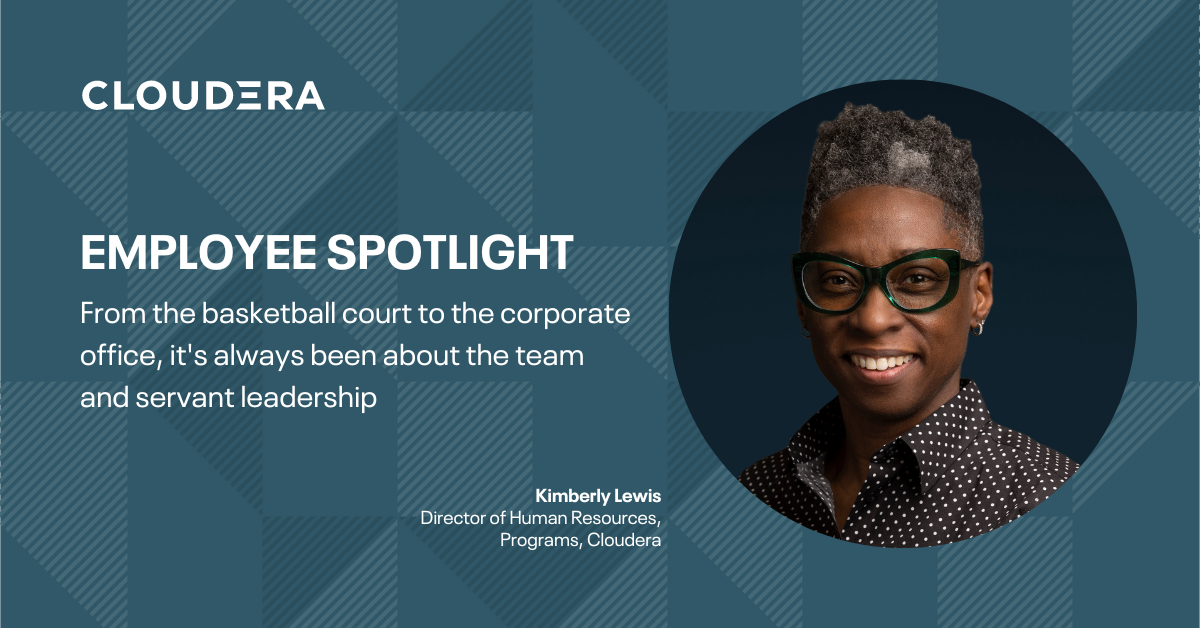As we celebrate Black History Month, for this #ClouderLife Spotlight we sat down with Clouderan Kimberly Lewis to talk about her career journey in human resources, growing up in New Orleans, and how her experience in basketball translated to leadership and career development in the workplace.
Kim is the director of human resources (HR) programs at Cloudera. She manages everything that happens on a programmatic basis in HR that has a strategy and a plan. “I work closely with the chief human resources officer on strategic planning as well as HR leadership,” she said. She also looks at each of the six HR leadership tracks to identify initiatives and help leadership be successful with pending and ongoing priorities.
Kim joined Cloudera two years ago. “At the time they were looking to fill a strategically focused role, which was a good fit with my past background as an HR business partner (HRBP),” she said. In her previous role, Kim led HRBP teams implementing strategies among all the HR areas. She functioned as the liaison between the field and corporate, where she needed to be an expert across all functional areas, developing a mindset for the larger company strategy.
As soon as she started at Cloudera there was an immediate need for her to implement an initiative around the workforce changes due to COVID-19 restrictions. “My very first responsibility was to oversee the COVID-19 committee at Cloudera,” she said.
“The best thing about Cloudera is the people that I get to connect with daily, there is nothing like it,” she said, describing her experience working at Cloudera. “The people I meet really want to do great work and they are excited about it. They are willing to sacrifice their time completely.”
Growing up in the Big Easy was about family, culture, and new opportunities through the love of basketball
Kim grew up in New Orleans in a close-knit, multi-generational family, but felt like the greater community of New Orleans was also family. “The passion of the city with a rich history wrapped in a cultural melting pot and anchored in the annual festivities of Mardi Gras. This is what makes New Orleans so special,” she stated.
It seemed like from the time Kim could walk she was involved with the game of basketball. Playing throughout her school days, she later earned a college basketball scholarship. Initially, Kim wanted to study architecture but chose a school that best fit her athletic aspirations that didn’t have architecture as a major. Then, after taking an employment law class she knew HR would be her major, and she has had a passion for it ever since.
With basketball, Kim went on to be a division-two point guard in her college years and then became a referee for semi-pro, and also coached at various levels since.
Soon after college, she settled in Atlanta to start her career where she has been ever since. Kim said, “They say if you’re in Atlanta longer than 10 years then you’re technically from Atlanta. I guess I now qualify.”
How lessons learned on the basketball court translate to the workplace
“Basketball and team sports have been a centerpiece throughout my life,” Kim said. “Being an athlete is very much a part of who I am and started my leadership foundation. I’m very much a servant leader and all about the team.”
Kim draws on lessons learned on the court to the workplace. Regarding organizational success, “working together accomplishes a lot more for yourself and the organization than being a star player or working as an individual,” she said. “Being a great player is one thing, but you don’t win unless you have a great team.”
In terms of looking at strategy, Kim has also drawn similar parallels. “Looking at the bigger picture versus the now is something I learned years ago in sports,” she said. “You might lose the game today knowing that there is a broader or bigger goal to win the championship. Similarly, in HR, for example, there are initiatives that we want to do today but must take a step back and look at the greater strategy to make sure the details align with our goals.”
These lessons also carry over to career development as she looked back at her own career path. “Not being afraid to fail,” she said. “I learned some of the biggest life lessons when things didn’t go right. Being able to reflect on what went well but learning the lessons of what didn’t work and not being afraid to adjust course.” She added, “Like in sports if you run a play and it doesn’t work, do you give up on the game? Or rather, take a step back and look at an alternative way to attack the situation and score?”
Another lesson that Kim attributes to her career progression is not being afraid to think differently or unorthodoxly. “It’s important in my role to be flexible and open to other ways of doing things,” she said. “Sometimes you have the best plans but things happen that change your trajectory. Our whole industry is always changing so we have to be flexible to change with it otherwise we will be left behind.”
Reflecting on Black History Month
In reflecting on Black History Month Kim said, “It’s such an emotional time for minorities because, on the one hand, we reflect on the struggle, and on the other, the feeling of pride for the accomplishments of minorities. All the great things that we have contributed to society and seeing the progress is exciting.”
“Reflecting as a Black American woman, it wasn’t that long ago when women were first allowed to vote,” she said. “My mother was in school during segregation. When I sent my daughters to school, they had a choice that my mother, who is only two generations apart, did not.” She adds, “Black History, although a month-long event, is up to us to keep top of mind all the time.”
The final question: did you regret not becoming an architect?
“I’m still passionate about architecture,” Kim replied. “When I travel, I make it a point to see the architecture of the area, it’s so fascinating to me. I try to get to any city that has fantastic architecture. I’m still a student of architecture. I’m also an ultimate DIYer. I have renovated my home many times over. But at the end of the day, my passion is for people, and HR is my way to contribute.”
As we close the conversation, we want to thank Kim for contributing so much to Cloudera and telling her story.




